Women Beware Women
No Place for Real Love or Real Women
By Thomas Middleton
American Shakespeare Center, Blackfriars Playhouse, Staunton, Virginia
Saturday, February 20, 2016, C–5&6 (center stalls)
Actors' Renaissance Season
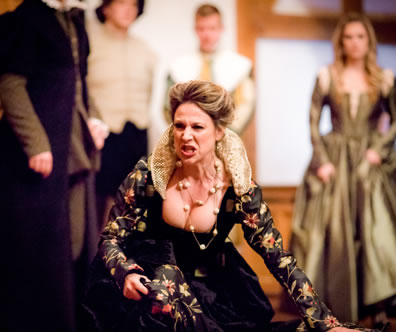 Livia (Ginna Hoben) reacts to the death of her lover, Leantio, in the American Shakespeare Center's production of Thomas Middleton's Women Beware Women at the Blackfriars Playhouse. In a play that delves into the complexity of morality, Livia is the centerpiece figure, and Hoben puts on a tour de force performance. Photo by Lindsey Walters, American Shakespeare Center.
Livia (Ginna Hoben) reacts to the death of her lover, Leantio, in the American Shakespeare Center's production of Thomas Middleton's Women Beware Women at the Blackfriars Playhouse. In a play that delves into the complexity of morality, Livia is the centerpiece figure, and Hoben puts on a tour de force performance. Photo by Lindsey Walters, American Shakespeare Center. Morality is a spectrum on a continuum of time and place. Thus, Thomas Middleton's morality tale of Women Beware Women ever shifts according to the audience's state of conscience at the specific time it takes in the play.
In its current incarnation at the American Shakespeare Center's Blackfriars Playhouse in Staunton, Virginia, the tectonic layers of ethics and desires among the play's characters shift under an explosive landscape of passion, ambition, and violence. On one level, it seems to be distanced from us; but deeper down, it reflects our own shifting layers of ethics and desires. Beware, maybe?
This is the company's third entry in this year's Actors' Renaissance Season, during which 12 actors with no director or production team and short rehearsal periods mount a five-play repertoire of Elizabethan, Jacobean, and Restoration plays over three months. This process means the actors are more reactive to the script than studied in it. Consequently, the morals of Middleton's play present as each richly drawn character's own particular truth traveling 400 years across time through the vessels of the actors.
Written sometime between 1620 and 1624, Women Beware Women has a simple ethic: Violating the laws of God, country, and your particular place in society will get you killed, usually by some bizarre means. Oh, and if you're a woman, play your cards for wealth and security rather than sex. The play expresses a bitter view of a society laced with lust—lust for sex, for money, for power—as the characters make choices according to what would more likely lead to a longer and more pleasurable life on earth (most of their choices don't do either, as it turns out). A ticket to everlasting life in heaven is just a value-added effect (Middleton apparently doesn't see many of them punching that ticket, either: "Sin, what thou art, these ruins show too piteously," the Lord Cardinal says in his admonitory speech that ends the play amid dead bodies strewn across the stage, up in the balcony, and below the trap door).
The cast made a key decision to costume themselves in Jacobean clothes (they scavenge their outfits from ASC's costume storehouse). Training in early modern English texts—not only William Shakespeare's but that of his contemporaries—provides the actors the muscle they need to effectively deliver Middleton's somewhat convoluted verse. With no central voice, collective desire, or sufficient rehearsal time to conceptualize Middleton's script or lay on it a tone that is not obvious in the playwright's intent, the cast gives a text-centric and pure presentation of Women Beware Women on a bare stage.
This makes Women Beware Women Middleton's play, not theirs. Due to that continuum of time and space on which our own morality has traveled, Middleton's play does not have as strong an ethical anchor for us as it might have for his own times. OK, incest is still pretty much taboo today, but women desiring sexual freedom, older widows wanting nonmatrimonial companionship of younger men, and the debate of whether fathers should make marriage arrangements for their children were more relevant issues for 17th century audiences than for their 21st century descendants. Nevertheless, the rich widow Livia hooking up with young stud Leantio titillates us still, and Bianca turning an assault into a gateway to wealthy living raises eyebrows (though probably for opposite reasons today than then). This distancing of the time of the play from the times in which we are watching it actually adds a bit of discomfort as we laugh not only at the obviously comic parts but also at the viciousness the characters visit upon each other.
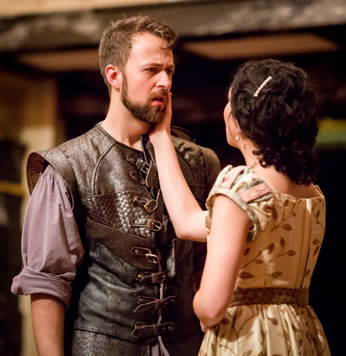
Leantio (Chad Bradford) can't understand his wife's change of heart (Bianca, played by Lexie Braverman) in Women Beware Women at the Blackfriars Playhouse. Photo by Lindsey Walters, American Shakespeare Center.
Every plot-strand, each weaving its singular way to the gruesome finale, evolves from a moral misstep and the subsequent choices it generates. Leantio (Chad Bradford) has eloped with Bianca (Lexie Braverman) and stowed her away with his mother, a poor widow (Allison Glenzer). Bradford and Braverman leave no doubt that their characters are giddily in love with each other, kissing constantly, hands always seeking a touch of the other's body. Theirs is an unbridled love, and if it is merely lust, at least it's legal. Well, sort of: her wealthy family was against the marriage and reportedly are trying to track the couple down, hence Leantio's need to hide Bianca away. Meanwhile, his mother believes he was wrong to entice her out of her promised fortune for the sake of love. Geesh, these kids. With Leantio traveling, his mother is watching the Duke of Florence (René Thornton Jr.) pass by and excitedly suggests her daughter-in-law watch, too. Bianca looks out the window, the Duke spies her and desires her.
Fabritio (Aidan O'Reilly) intends to marry his daughter Isabella (Lauren Ballard) to a rich young heir identified only as "The Ward" (Benjamin Reed). Guardiano (Patrick Midgley), the Ward's uncle and guardian, is pursuing the match, too. There's one problem: the Ward is "simple," a euphemism for really stupid. I'm not talking about intellectual disability here, but Jersey Shore stupid. Reed plays the Ward as a clueless, self-centered, rich brat who never matured. He's always playing with a toy—or trying to, as he can't hit a ball with a paddle, and his yo-yo rolls over and plays dead. Isabella is an accomplished young lady, intelligent, well read, a good dancer, and a great singer (Ballard kind of plays herself here). Guardiano is at the end of his patience with the boy and wants him married and out of his hair, and Midgley slides effectively from grinning charm to gritting testiness, imploring the audience's sympathy—which we readily give him. Fabritio is blithe to his daughter's dilemma, O'Reilly playing him in a state of perpetual whimsy.
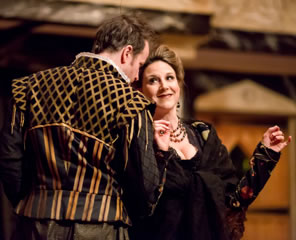
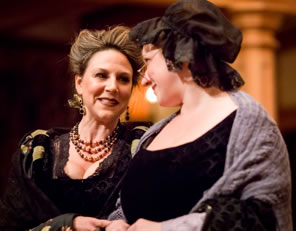
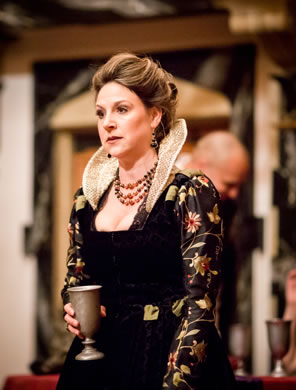
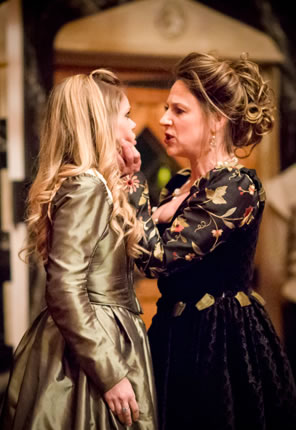
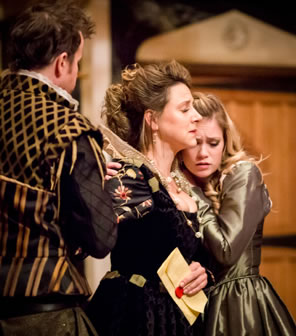
The many faces of Livia (Ginna Hoben) in Women Beware Women at the Blackfriars Playhouse. From top: Showing sisterly love to Hippolito (Chris Johnston); spinning a web around the Poor Widow (Allison Glenzer); meditating on her widowhood; accusing her niece, Isabella (Lauren Ballerd), of an incestual relationship with her uncle (which Livia helped bring about); dissembling an apology to her brother and niece. Photos by Lindsay Walters, American Shakespeare Center.
Fabritio has a sister, the rich widow Livia (Ginna Hoben), and a brother, the cavalier Hippolito (Chris Johnston). Livia is a strong, independent woman who has buried two husbands and intends not to marry again because "the third shall never bury me." She takes up her niece's cause, calling it an "injustice to force her love to one she never saw." Women have few other options, Livia points out; A man "tastes of many sundry dishes that we poor wretches never lay our lips to, as obedience forsooth, subjection, duty, and such kickshaws, all of our making, but serv'd in to them. And if we lick a finger, then sometimes, we are not to blame; your best cooks use it." Livia sounds like a thoroughly modern woman stuck in Middleton time, and Hoben plays her with a winking cynicism. But these lines prove to be more plot prophecy than ideological stance.
For Livia is a moral vacuum that sucks everybody else into their own damnations, starting with her brother, Hippolito. He and his niece, Isabella, are inseparable playmates, and it turns out that he is head-over-heels in love with her. But when he reveals his true feelings to Isabella, she, understandably, reacts with disgust. He appeals to Livia for assistance, and because she and Guardiano are fueling each other's ambitions—Guardinio for Livia's family wealth, Livia for his connections to the Duke—she readily grants Hippolito's wish. She engineers a quid pro quo with Isabella by telling her she's not really Hippolito's niece and that marrying the Ward will give them cover to carry on a full-fledged affair. Guardiano, meanwhile, has heard the Duke's desire to obtain the mystery woman in the poor widow's window. So, Livia invites the poor widow for an afternoon tête-à-tête, pries her about the mystery woman, insists she fetch her new daughter-in-law to join them, and then has Guardiano take Bianca on a tour of her home's art galleries. As the two widows play chess on the main stage, up in the balcony Guardiano leads Bianca into an ambush by the Duke. Bianca afterward delivers her not-so-veiled disgust with Guardiano's pimp act (and Midgley maintains the confident politician's ever-pleasant expression all the while).
The slippery slope Livia's actions have now put everyone on turns into an avalanche down a precipice. Bianca concludes she actually would prefer both the easy life near court and the attentions of the Duke instead of enduring her mother-in-law's poor home during her husband's absence. This leaves Leantio understandably peeved, so the Duke makes him captain of his ship—which Leantio, tapping down his moral indignity, accepts. Still, he simmers, and as Livia notes this, she propositions him for their own sexual tryst. He accepts. Word gets to the Duke who leaks the news to Hippolito, figuring the brother's sense of family honor will inspire him to challenge and kill Leantio. Meanwhile, the Duke's own brother, the Lord Cardinal, accosts the Duke and chastises him for living in sin with Bianca. The Duke seeks forgiveness and promises to avoid Bianca's bed—for that night, at least, as he figures Bianca will be a widow by the morning and he can properly marry her.
Hippolito does, indeed, kill Leantio in a duel—and I pause in the plot summary for an aside noting that ASC is among the best practitioners of stage combat on the globe, and the thrust of Johnston's sword that kills Bradford's Leantio is a whoa! moment. Livia is so distraught she reveals the incestuous affair between Hippolito and their niece. Later, Livia apologizes, but it's part of her revenge plot with murdering Hippolito's true love, Isabella, as the tit-for-tat goal. Isabella knows Livia is dissembling and seeks revenge of her own by killing her aunt for revealing hers and Hippolito's incest. Guardiano plans to defend his nephew's honor by getting rid of his new daughter-in-law's incestuous lover, Hippolito. And Bianco, harboring a grudge over the nasty things Lord Cardinal called her, plans to murder him—this despite her lecturing him that though she finds "great knowledge in you…yet 'mongst all your virtues I see not charity written, which some call the first-born of religion." It's a beautiful speech reminiscent of Portia's and Isabella's similar takes on mercy in Shakespeare's plays—but in Middleton's play, the speaker is a hypocrite, like everybody else in the play. Except the Cardinal: he was mean to Bianca, but when she points it out to him, he asks her forgiveness. She decides to kill him instead.
Each revenging assailant plans to weave his or her own particular murder plot into a pageant being played for the Duke and Bianca's wedding. Women Beware Women's final scene is an inventory of unusual murder weapons: poisoned incense, flaming gold (substituted in this production by a poisoned gold sheet), a body-skewering spike below the trap door, Cupid's poisoned-tipped arrow, and a good ol', tried-but-seldom-true, chalice of poisoned drink. Three of these weapons hit their intended marks; the other two kill the wrong person, and one of those deaths leads to another's suicide.
So, is this a comedy or a tragedy? The answer is yes. This is the second time we've seen this play, and a 2010 adaptation by Constellation Theatre in Washington, D.C., couldn't decide whether to play it straight or as an over-the-top farce. A theater director, recently telling me of her intent to stage the play this year, described Women Beware Women as "a Jacobean tragedy in which everyone dies and it's hilarious."
The fact is, Women Beware Women is as much a comedy and tragedy as life itself. The comedy operates on four levels in this production. Fully entering into slapstick is the courtship between Isabella and the Ward. After she demonstrates her talents (including singing Leonard Cohen's "Dance Me to the End of Love" and then performing a gorgeous ballroom dance with Johnston's Hippolito), the Ward attempts to demonstrate his assets to disastrous results. His dance with Isabella is as comical as her dance with Hippolito is beautiful, including his landing an accidental uppercut to her chin and stomping on her foot. The play uses situational comedy, including during the finale: The Duke knows the script to the pageant, so when the show goes off track with death after death (but nobody is yet aware the players are actually dying), he gets more and more confused and frustrated. "I have lost myself in this quite," he says, and Thornton's delivery of this line earns one of the biggest laughs of the production. The comedy is wit-driven, too, the primary example being the Ward's servant, Sordido (John Harrell), whose sole purpose is to speak satirical stabs at his master and at society. The fourth level is circumstantial comedy: that finale, let's face it, is ridiculously extreme, though it is vintage Middleton (he goes for a Guinness world record for deaths in a play in The Revenger's Tragedy).
So, it's not the catalog of deaths that gives this play its tragic identity (except, perhaps, Leantio's). Rather, the domestic disappointments carry the greater tragic tenor. Bradford's Leantio doesn't know how to react as he moves from puzzlement over Bianca suddenly distancing herself from him through shock and anger to utter confusion at her behavior, the Duke's behavior, and his own behavior—he accepts the Duke's appointment though he knows it makes him a bawd to his wife. He needs to be angry, he needs to be honorable, he needs to be smart, but attempts at each give Bradford's Leantio no satisfaction. Livia gives him sexual healing but no true satisfaction, either, and he dies the very opposite of the way we first saw him living—from an extreme of joy to an extreme of dispair—but both extremes come from the same source, being consumed with love for Bianca. It's the tragedy of true love in a society that values lust more.
The scale of morality, the spectrum of comedy to tragedy, the blurring of personal and social identities: all of these continuums are wrapped up in the single character of Livia, the play's—and this production's—centerpiece as presented in one heckuva performance by Hoben. Middleton has written a richly textured middle-aged woman who is as good as she is bad, as true as she is false, as witty as she is foolish, as socially powerful as she is emotionally frail, as reserved as she is sexually driven. This is a crowning performance for Hoben as she intelligently treads the spectrum of Livia's character while plunging into the depths of the rich widow's being. Her great fake dissembling scene—when she apologizes for her outburst following Leantio's death and enlists everyone's help in staging the pageant—ends with her remaining behind alone on stage to emit a roar of anguish that fastens an iron grip on our throats. It starts as a groan that's almost comical but quickly shifts into a wall-rattling wail leaving us in no doubt that this woman has a hurt that can never be extinguished and probably has been burning since long before she met Leantio. It's a life lament, the tragedy of being a woman in a society that won't let her.
Eric Minton
February 27, 2016
Comment: e-mail [email protected]
Start a discussion in the Bardroom



 Find additional Shakespeareances
Find additional Shakespeareances